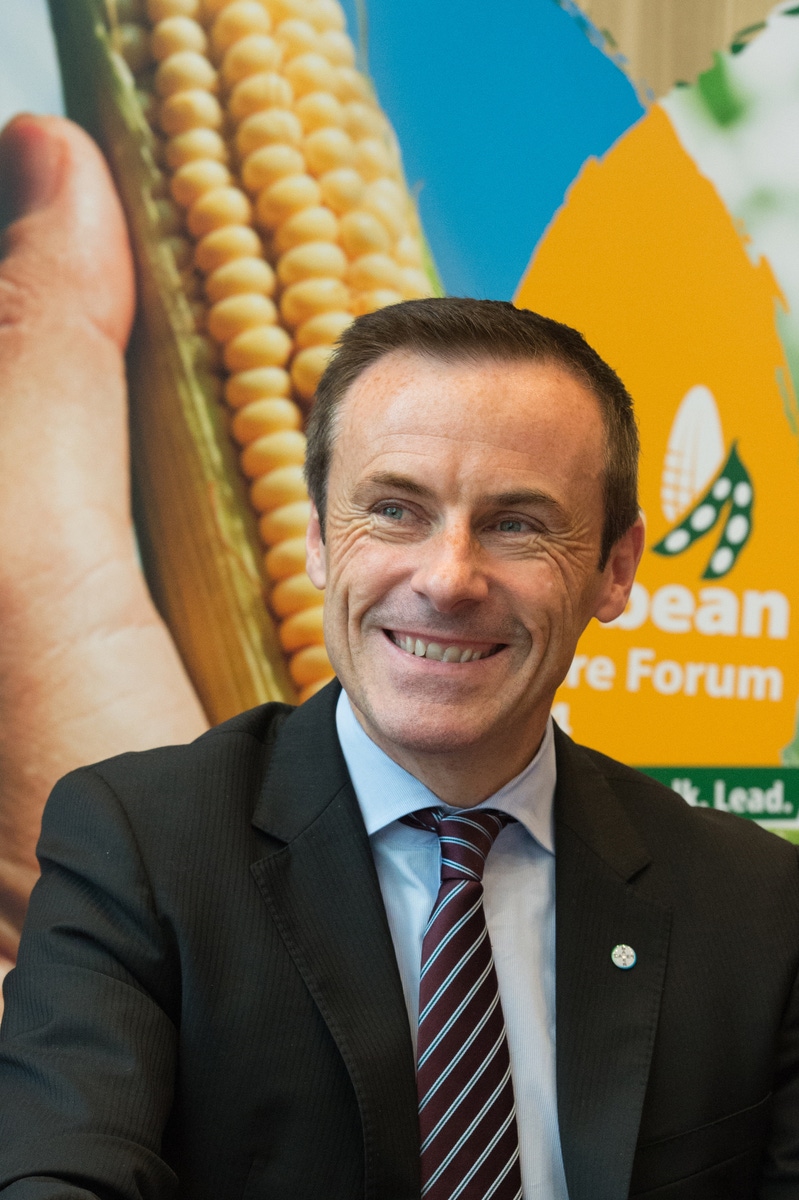December 1, 2014

Liam Condon, CEO of Bayer CropScience, sat down with a select group of North American journalists during the company’s 2014 Corn and Soybean Future Forum, held recently in Frankfurt, Germany.
Condon, who was named CEO at Bayer CropScience in December of 2012, had just returned from a conference call with investors, proving comments regarding the company’s third quarter results. It was an upbeat conversation. According to the company, sales in the Bayer CropScience unit increased 12.7 percent in the third quarter, with sales in North America logging a 23.2 percent increase for the quarter.
Condon shared his perspective with a few of the topics facing North American agriculture.
GM trait acceptance
The current controversy regarding Syngenta’s Agrisura Viptera trait, not yet approved in China, has led to a series of lawsuits.
Condon was asked about the current issue, and the position of Bayer CropScience:
“This issue (trait acceptance) is highly sensitive. And at the moment corn producers in the U.S. are very concerned. The position of Bayer CropScience is very clear: if our traits are not deregulated in China, or any major import market, we will not undertake a full commercial launch in the United States. Period.”
“We understand that there is concern within the industry that we cannot wait forever for China to deregulate a certain trait, and we should not delay innovation that will benefit U.S. producers. But the reality is that we need a strong stewardship system to prevent traits from ending up in major markets where they are not approved.”
Working on new active ingredients for weed management issues
Bayer CropScience has put a major effort into its herbicide research program. The company currently invests nearly 10 percent of its overall budget into research. The company’s newly opened Weed Resistance Competence Center, located in the Industriepark Hoechst on the outskirts of Frankfurt, Germany, is a hotbed of activity as researchers diligently search for the next active ingredient. Not only does the company rely on tried-and-true research methods, but are investing in new technologies to allow researchers to screen more and more potential new products.
And while Bayer CropScience, and other crop protection companies, continue their search, experts caution that a new active ingredient will not be a panacea to today’s weed management issues. Any new product, if overused, would lead producers back to herbicide resistance issues.
“Our glufosinate product can be used by producers who are battling herbicide-resistant weeds. But if we use that product in the same way glyphosate was used, we will have the same issues. Our approach is diversity. We want producers to rotate the active ingredients, rotate the crops and rotate the methods. These are smart combinations that can help producers in their battle with herbicide resistant weeds,” Condon says.
“It is a total illusion that there will be a new product that will not develop resistance. Anything, if overused, will develop resistance. A single product is never a solution. That is why education is part of our strategy when working with producers. This approach does make weed management more complicated, but we need to help producers in developing a sound strategy.”
Neonicotinoid seed treatments
A shockwave was sent through the industry earlier this fall when, according to EPA analysis, neonicotinoid seed treatments provide little or no overall benefits to soybean producers in most situations.
“We were surprised that part of the reevaluation came out as a standalone announcement. Normally, the reevaluation process is pretty holistic and contains multiple parts. We did not see the report in advance, and after our review we think the EPA analysis is not taking a lot of field data from producers into account.”
“Real-life experiences from farmers has not been reflected in this current assessment. So we have provided additional research data to the EPA. We have had positive feedback from producers who indicate that they clearly see the benefits of neonicotinoid seed treatments. Farmer’s don’t pay for something where they don’t see a return."
Like what you’re reading? Subscribe to Farm Industry News Now e-newsletter to get the latest news and more straight to your inbox twice weekly.
About the Author(s)
You May Also Like






